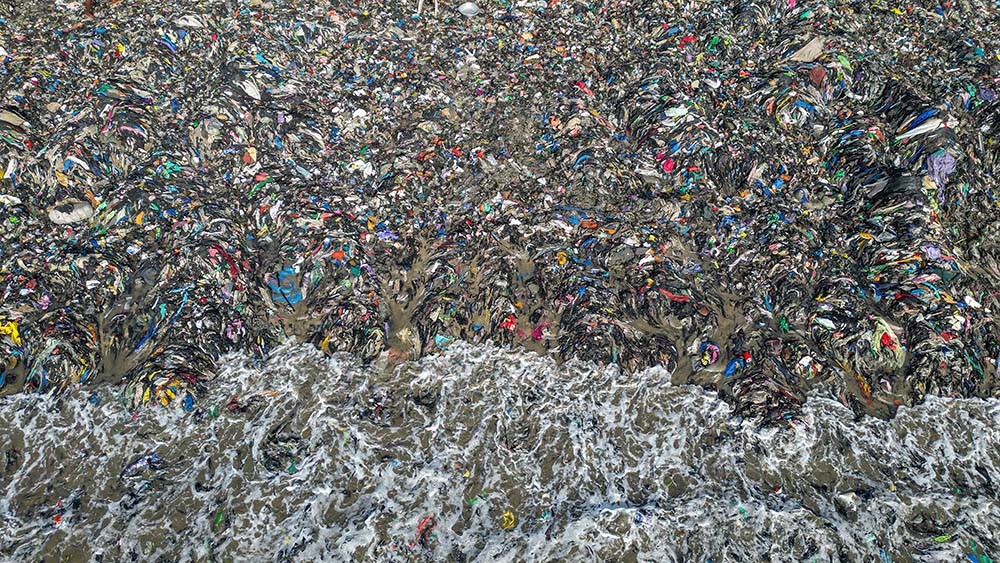
(Dreamstime/Oksana Krasiuk)
This Lent, I've been reflecting on how the religious observance known for repentance and renewal coincides with seasonal "spring cleaning" — a tidying up ritual familiar to most American households. Throughout March, April and May, spring cleaning provides the opportunity for households to reflect and take stock of what they have, bring order to mess and "unburden" themselves of clutter.
But this personal improvement comes at a cost to other people and the planet, as it feeds a throwaway culture hell-bent on a cycle of rapid consumption and disposal. What are we to do when we seek to simplify? Can we tidy our own lives without negatively impacting others? It's possible to strike a balance between honoring our homes and honoring God's creation — but to get there, we first have to grapple with the paths our decluttered stuff takes.
At the first signs of spring, I eagerly survey each room in my apartment and create piles for items that no longer serve or suit me. The corners soon amass a menagerie of stuff: too-small clothes, neglected pans, plastic skin-care containers and miscellaneous trinkets. Every time I gather items to declutter, I'm amazed at how many things I've accumulated throughout the year.
After moving apartments in 2022, I vowed that I would monitor my consumption habits. Of course, I broke this vow. My entanglement in stuff embarrasses me — but letting go of items provides some relief.
Decluttering can feel freeing. Self-help guides detail the benefits of tidying up our lives. With less stuff to organize and clean, we can spend more time enjoying our living spaces. Decluttered closets become more manageable; we can see the outfits previously stuffed in the back. Parents with young children talk about the freedom they feel after halving their infants' toy collection. Others share enthusiasm about disposing of household excesses when moving to a new home. And who doesn't feel a rush when they deposit tangled tech equipment — computer mouses, electronic chargers and other ephemera — in a bag for the thrift store?

Textile waste pollutes the beach shore at Jamestown in Accra, Ghana, Oct. 19, 2024. (AP/Misper Apawu)
Of course, these perspectives belie the reality of our decluttering habit. Decluttering isn't elimination. We might tidy our homes and offices, but our stuff hasn't disappeared. When we declutter, we're just relocating our stuff elsewhere. Donations might be a well-intentioned effort to avoid the landfill, but unfortunately those materials often end up elsewhere in the Global South.
For example, the clothes we donate to secondhand stores may eventually be sent to Chile, where they rot in the Atacama Desert. Secondhand clothing importers, like Kenya and other African countries, have established local economies on secondhand clothes to manage the inflow — yet textile waste is inevitable. Kenyan thrift markets have struggled from deteriorating quality in secondhand imports. One Changing Markets study found that Kenyan clothing traders had to discard anywhere between 20-50% of imported clothing due to poor quality and inability to be sold.
These countries lack the environmental infrastructure to properly dispose of clothing waste, so it injures local communities and environments. In Kenya, Changing Markets says, the Nairobi River has become cluttered with clothing waste from the nearby Gikomba textile market — a harrowing result of insufficient waste disposal. Moving westward, Ghana's Korle Lagoon suffers a similar fate, as clothing piles gather on the banks and microplastics slough into the water, as Greenpeace reports.
Electronic waste — from televisions and telephones to laptops and printers — similarly deposited at thrift stores also makes its way to other countries. While these items can be harvested for metals, informal and unregulated recycling systems in low- and middle-income countries can release dangerous chemicals like mercury and lead into local environments, according to a report by the the United Nations Institute for Training and Research.
The United States is one of the world's largest e-waste contributors. The United Nations Institute for Training and Research reports that the U.S. generated approximately 15.8 billion pounds of e-waste in 2022, with the average person in the U.S. generating 46 pounds.
Even our diligent plastic recycling creates problems elsewhere. The United States exports a significant amount of plastic waste overseas — approximately 915 million pounds in 2024, according to the Basel Action Network. Data from the network reveal that less industrialized nations, including India, Indonesia and Malaysia, are top importers of plastic waste from the Global North. These imports include plastic scraps, plastic waste in electronics, synthetic textiles and even illegally trafficked plastic waste.
As most importing countries lack sufficient waste management infrastructure, they resort to burning waste in residential areas or open dumpsites to clear space. These practices contribute to air pollution, impacting the health of nearby communities.
These examples of textile, electronic and plastic waste reveal the impact of decluttering on a macroscopic scale. They also powerfully remind us that our consumption habits — the same ones that cause us to be overwhelmed with clutter — are unsustainable. The United States' tendency to treat countries in the Global South like disposal sites for production waste is untenable. If we are to live into the biblical mandate to be stewards of the Earth, we must rethink our behaviors on personal, communal and institutional levels.
Advertisement
This year, my Lenten reflections have centered on repentant repair. When I take time to sit with the impacts of my seemingly innocent and well-meaning drop-offs to Goodwill, I am given an opportunity to mend the wound I've imposed on creation, albeit imperfectly. Here are some actions I'm pursuing.
Personal
I've committed to a "low buy" Lent and have accountability partners to help me see it through. While this commitment isn't perfect, it's helped me to be more intentional about my consumption practices throughout these 40 days and reorient toward commitments to people and planet. I've also chosen to allocate the money I typically spend on outfits or trinkets toward mission-driven organizations, such as The Or Foundation's Secondhand Solidarity Fund, which supports Ghanaians impacted by the Global North's secondhand clothing waste.
Community
Instead of relying on impersonal donation drop-offs, I've whittled away at my living room donation piles by distributing things to my neighbors through a Buy Nothing group, which creates gift economy networks in your local community. I've seen my neighbors distribute functional kitchen appliances, clothing and children's toys to community members with ease — and I've followed suit.
Institutional
In the time I typically spend scrolling online retailer websites, I've shifted my attention toward sustainable policy efforts to crack down on waste and hold retailers accountable for their excess production practices. In California, the recently passed Senate Bill 707 (Responsible Textile Recovery Act of 2024) implements extended producer responsibility rules in the state, requiring apparel and textile producers to fund circularity programs. Other states are joining the extended producer responsibility legislative landscape, such as Minnesota's recently enacted Packaging Waste and Cost Reduction Act and Oregon's Recycling Modernization Act.
Acts of repair can look different for each person, but are united under a common purpose: to combat the culture of death created by throwaway culture, and to act in ways that better serve God's creatures and creation.






